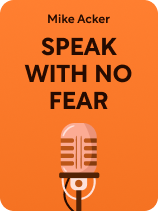

This article is an excerpt from the Shortform book guide to "Speak With No Fear" by Mike Acker. Shortform has the world's best summaries and analyses of books you should be reading.
Like this article? Sign up for a free trial here.
Do you let anxiety get the best of you during public speaking? What if you could harness that nervous energy to deliver powerful presentations?
Public speaking nerves are a common experience, but they don’t have to hold you back. In fact, that nervous energy can be a powerful tool when channeled correctly. By focusing on your purpose and staying present, you can transform anxiety into enthusiasm.
Read on to discover practical strategies for conquering your fears and becoming a more confident, engaging speaker.
Public Speaking Nerves
In public speaking, nerves are pretty much a given. However, public speaker and coach Mike Acker argues that’s actually a good thing—you’re nervous because you care and you want to do well. Furthermore, you can harness that nervous energy to deliver a more forceful, more passionate speech than you could ever give while you’re totally calm.
(Shortform note: Fear and excitement are closely related feelings with nearly identical physical responses: increased heart rate, faster breathing, a surge of adrenaline, and so on. Therefore, you can harness your stage fright like Acker suggests by reframing your fear as excitement. One way to do that is by changing the way you talk to yourself about public speaking—instead of telling yourself that you’re nervous or that you can’t speak in front of a crowd, try telling yourself that you’re going to do great and impress the audience. Alternatively, try thinking about all the good that could come from this speech or presentation; for example, if it’s work-related, perhaps doing well will get you a step closer to a promotion.)
The author says that the key to using your nervousness effectively is purpose. Remember why you’re there and what message you’re trying to convey, and focus your nervous energy on that purpose. Use the energy to invigorate your words and your movements. Even the pauses in your speech should be purposeful; they’re a chance for you to take a breath and recenter yourself.
Conversely, if you don’t have a focused purpose, you’ll just waste that energy on anxious fidgeting and pacing—in other words, your energy will work against you instead of working for you.
(Shortform note: Keeping your purpose in mind gives you a goal to focus on, which will help you stay fully engaged in what you’re doing. That engagement, in turn, will relieve your feelings of anxiety. In Flow, psychologist Mihaly Csikszentmihalyi explains that being totally focused on your task (in this case, giving a speech or presentation) means you can’t devote any attention to feeling worried or self-conscious. In fact, while thinking back on times when they were absorbed in a task, people frequently report that they felt calm and in control—the exact opposite of feeling anxious.)
Supporting Strategy #1: Focus on the Here and Now
Acker says that the key to harnessing your nervous energy is to keep your purpose in mind; the most effective way to do that is to keep your attention on the present moment, instead of regretting the past or worrying about the future. In fact, you can practice this strategy during every step of public speaking.
First, while you’re preparing and writing your speech, don’t get impatient and wish that the speaking event would come sooner. Instead, relish the chance to learn more about the topic and practice your speaking skills.
Then, during your speech, don’t distract yourself by thinking about what else you wish you’d included in it, or by worrying about what you’re supposed to say next. Remember: Your audience doesn’t know what you wrote, so it doesn’t matter whether you follow the script word for word—a strong sense of purpose and a genuine connection with your listeners are much more important.
Finally, once your speech is over, accept whatever happened and move on. Remember that you did the best you could in that moment, and stressing about it after the fact won’t change anything. You can celebrate what went well and identify things that you could improve upon for next time, but the most important thing is this: Savor the fact that you faced your fear, you gave the speech, and now your life goes on.
| Reduce Anxiety With Mindfulness Meditation Acker advises you to overcome anxiety by staying focused on the present moment. Another way to say this is that he’s advising you to practice mindfulness. Being mindful means being fully aware of everything that’s happening to you from one moment to the next. This includes internal experiences, such as your thoughts and feelings, as well as external stimuli like sights, sounds, and smells. Mindfulness also allows you to notice how you’re responding to those stimuli. For example, are you feeling stress and fear, or are you in a state of calm acceptance? By becoming more aware of your moment-to-moment responses, you can begin to make more conscious and purposeful choices about how you want to handle your current situation. One common way to build mindfulness is through meditation. Meditation involves setting aside dedicated time to focus your attention on one specific thing—such as your breathing or a mantra you’ve chosen—to the exclusion of all else. This exercise trains your mind to be more present and less easily distracted, including by your own stray thoughts and emotions. In fact, some experts say that practicing meditation for just a few minutes each day can greatly improve your ability to stay focused on the here and now. |

———End of Preview———
Like what you just read? Read the rest of the world's best book summary and analysis of Mike Acker's "Speak With No Fear" at Shortform.
Here's what you'll find in our full Speak With No Fear summary:
- How to become a confident and compelling speaker
- How to plan for the worst when you’re speaking on stage
- Why people in the US fear public speaking even more than death






